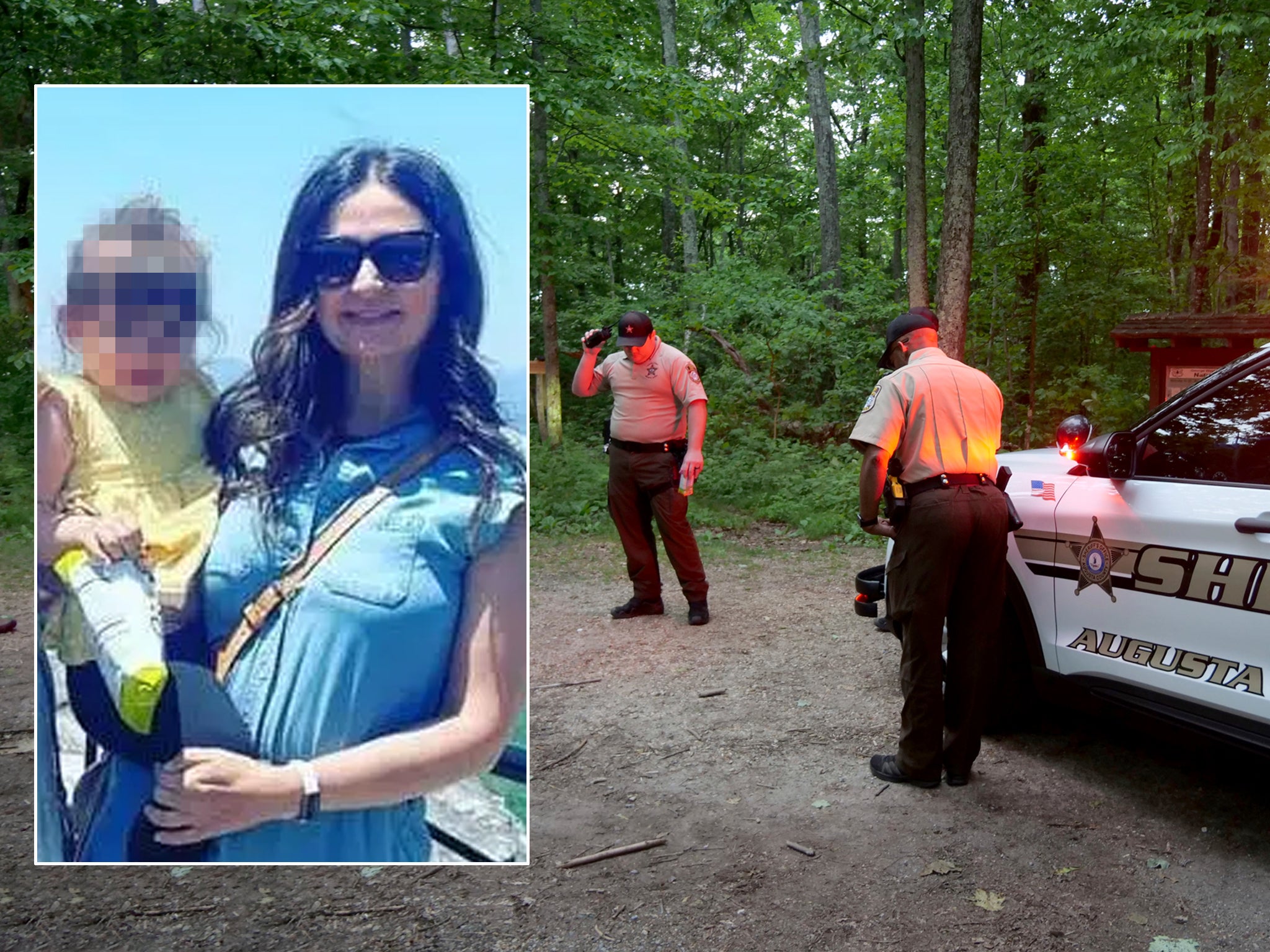A sonic boom, a baffling plane crash and a family destroyed: Inside the Virginia tragedy that sparked a F-16 response
No survivors found after Cessna Citation plane wrecked in Virginia mountains following unauthorised flight over Washington, with thunder clap heard as two F-16s went supersonic in race to intercept it. Joe Sommerlad writes


Your support helps us to tell the story
From reproductive rights to climate change to Big Tech, The Independent is on the ground when the story is developing. Whether it's investigating the financials of Elon Musk's pro-Trump PAC or producing our latest documentary, 'The A Word', which shines a light on the American women fighting for reproductive rights, we know how important it is to parse out the facts from the messaging.
At such a critical moment in US history, we need reporters on the ground. Your donation allows us to keep sending journalists to speak to both sides of the story.
The Independent is trusted by Americans across the entire political spectrum. And unlike many other quality news outlets, we choose not to lock Americans out of our reporting and analysis with paywalls. We believe quality journalism should be available to everyone, paid for by those who can afford it.
Your support makes all the difference.Residents of Washington DC were relishing the pleasant warmth of early summer on Sunday afternoon, relaxing in their backyards, listening to the birdsong or going about their chores at leisure, with nothing to disturb the peace of a fine sunny day.
Then, out of nowhere, the still tranquillity was suddenly shattered by a huge sonic boom erupting in the skies overhead.
Dogs were sent barrelling from patio furniture, houses rocked where they stood and a couple sitting down to record a folk song were left wide-eyed with panic as the blast interrupted their performance, moments captured on video and documented on social media later that evening after the initial alarm had subsided.
The thunder clap proved to have been caused by two F-16 fighter jets, travelling at supersonic speed as they were scrambled into action from Joint Base Andrews in Maryland to intercept a wayward Cessna 560 Citation V private jet.
The civilian aircraft had drifted over the capital’s restricted airspace without authorisation, passing such sensitive sites as the White House and the US Capitol, its pilot Jeff Hefner since reported to have been seen “slumped” in the cockpit as investigators hunt for answers.
President Joe Biden happened to be playing golf with his brother close to the very same air base and was briefed on the incident but not removed from the scene, according to a Secret Service spokesman.
DC Homeland Security and Emergency Management moved quickly to assure the locals that the boom they had heard did not indicate a terrorist incident and tweeted: “There is no threat at this time.”
But the US Capitol Police later stated that the legislative complex “was briefly placed on an elevated alert until the airplane left the area” as a precaution, indicating the uncertainty about the rogue jet’s intentions when it first loomed into view.
Meanwhile, its pilot continued to fail to respond, either to radio messages sent to the cockpit or to the flares fired close by from the F-16s to get their attention.
After drifting out of DC airspace and into northern Virginia, the plane finally crashed to earth in a remote mountain region between Staunton and Montebello in the Shenandoah Valley, about 150 miles southwest of DC, at around 3.30pm local time.
State police arrived at the scene shortly after but found no survivors among the wreckage.
The Federal Aviation Administration (FAA) subsequently told The Independent that the private aircraft had taken off from Elizabethtown, Tennessee, and was bound for Long Island’s MacArthur Airport in New York.
According to the FAA, it had flown at an altitude of 34,000 feet and did reach Long Island but, rather than attempt to land, instead mysteriously headed back towards the DC area.
Florida businessman John Rumpel, 75, owner of Encore Motors of Melbourne and a prominent donor to conservative political causes aligned with Donald Trump, has since come forward to tell The New York Times and Washington Post that he owned the doomed plane and that it was carrying his daughter, a two-year-old granddaughter and her nanny as well as the pilot when it went down.
Mr Rumpel told The New York Times on Sunday afternoon that he had little information about the crash but said that if the plane had lost pressurisation: “They all just would have gone to sleep and never woke up”.
He added: “It descended at 20,000 feet a minute, and nobody could survive a crash from that speed.”
His wife Barbara, a member of the National Rifle Association’s Women’s Leadership Council since 2002 and its executive committee for at least six years, also confirmed the tragedy, writing on Facebook simply: “My family is gone, my daughter and granddaughter.”
The victims were subsequently identified as the couple’s adopted daughter Adina Azarian, 49, her two-year-old daughter Aria and nanny Evadnie Smith.
The Rumpels had adopted Adina, a real estate agent by trade, at the age of 40 because she reminded them of their late biological daughter Victoria, who had died in a scuba diving accident in 1994, aged just 19.

The two women had “the same fire in their bellies, and they were loving, caring children,” they said.
After Victoria’s death, the Rumpels had bought an 11-storey building in Melbourne, Florida, and turned it into Victoria Landing, an assisted-living facility named after their late daughter.
“Victoria Landing gets its name from Victoria Rumpel. Victoria was John’s daughter who died tragically at the young age of nineteen in a scuba diving accident,” its website states.
“John honors the memory of his daughter with the Victoria Landing name. With that honor comes the responsibility to make Victoria Landing the very best it can be… in commemoration of Victoria and in celebration of everything life can and should be. Life is simply too precious.”
Aviation expert Steve Ganyard speculated on ABC News that evening that the pilot may have been afflicted by a condition known as hypoxia, which could have caused the fatal crash.
Hypoxia “occurs when there is not enough oxygen in the cabin,” he explained, saying that it can lead to incapacitation.
“The pressure should keep enough air in the cabin to stay alert and stay awake. In this case, it can happen insidiously where you lose consciousness, you begin to feel tingling, you get a sense of euphoria and it very slowly overcomes the people in the cabin,” Mr Ganyard said.
Anthony Brickhouse, an associate professor and director of the Aerospace Forensic Lab at Embry-Riddle Aeronautical University, said of the condition: “It’s something that happens slowly. It’s almost like you’re getting groggy, and you just can’t, you can’t piece things together. And eventually, you lose consciousness.”
Mr Brickhouse said that aircraft are often set to fly on autopilot “so if the pilot goes hypoxic or loses consciousness, that aircraft is just going to fly whatever route it was programmed to fly.”
It remains unclear why the plane suddenly turned around in New York and headed south again but the expert said it is possible the pilot was disoriented and may have “tried to reprogram a flight computer or something like that.”
The FAA and the National Transportation Safety Board will now investigate what caused the Cessna crash, as the Rumpel family mourns an unthinkable tragedy and rescue workers survey the wreckage, where human remains have been found, amid difficult forest terrain.
Subscribe to Independent Premium to bookmark this article
Want to bookmark your favourite articles and stories to read or reference later? Start your Independent Premium subscription today.



Join our commenting forum
Join thought-provoking conversations, follow other Independent readers and see their replies
Comments